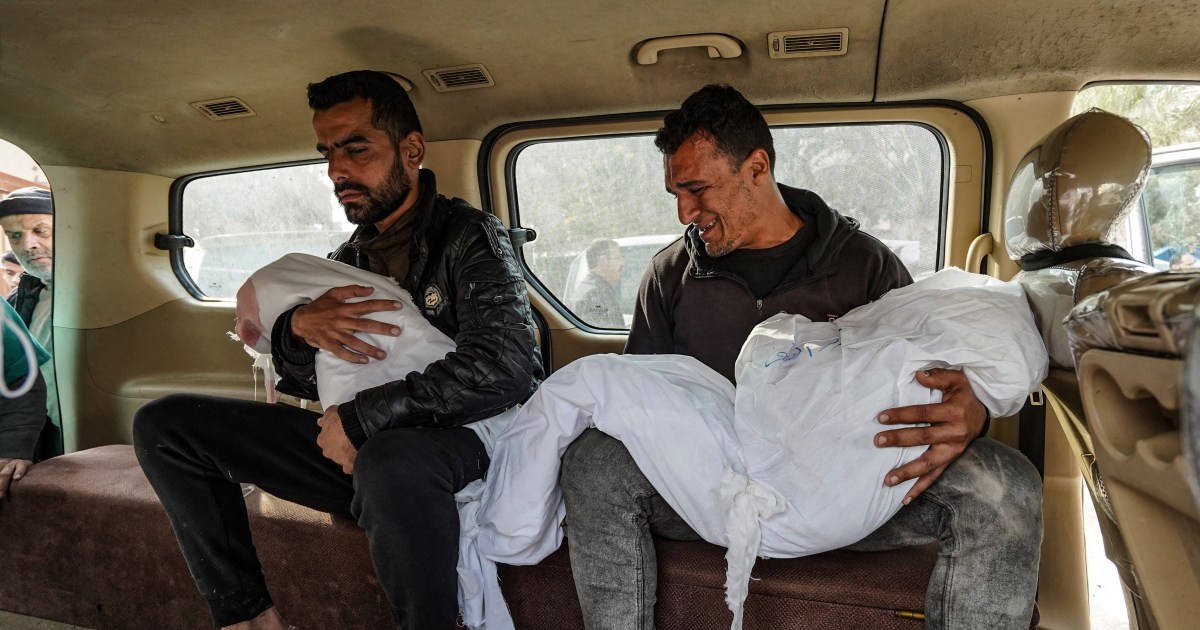
“[T]The reality of concentration camps resembles nothing more than medieval images of hell.” – Hanna Arendt
In February 2008, Matan Vilnai, then Israel’s deputy defense minister, said: threatened the Palestinians of Gaza with a “holocaust”. “They will bring an even greater Shoah upon themselves because we will use all our forces to defend ourselves,” he said in an interview on Israeli army radio, using the Hebrew word for Holocaust.
It is important to remember this statement today, as activists and analysts face abuse for comparing what is happening to the people of Gaza now to what European Jews suffered at the hands of the Nazis last century.
The word “Shoah” is never used in Israel outside of discussions of the Nazi extermination of Jews during World War II. Many Israelis, especially Zionists, have a serious problem with people using it to describe other genocides.
Nevertheless, the deputy minister decided to threaten the Palestinians with a “Shoah”. It’s clear he knew what he was referring to and he didn’t mince his words.
In December 2008, ten months after Vilnai’s interview, Israeli occupation forces launched a massive military attack on the Gaza Strip that lasted 22 days. Israel killed more than 1,400 people in that attack, the vast majority of whom were children and women.
Back then, no one mentioned the forbidden word. No one dared to compare the military operation, grotesquely called “Cast Lead,” with the “Shoah.”
The so-called “international community” did nothing to protect Palestinian civilians. Just as it did nothing in the late 1930s when it stood aside and watched idly, refusing to provide protection to the innocent civilians fleeing the massacre at the hands of the monster Nazi regime.
Nazi war criminals long operated with complete impunity, relying on the support of ordinary Germans and the indifference of the “international community,” which enabled what the late philosopher Hannah Arendt called “the banality of evil.”
For this reason, the Nazis felt comfortable repeating the same crimes over and over again. What Nazi officers did next looked “terrifyingly normal.” As Arendt described the actions of a Nazi bureaucrat, he committed crimes “under circumstances that made it almost impossible for him to know or sense that he was doing injustice.” The Nazis killed and felt no remorse afterwards.
Today we would call this the normalization of war crimes and crimes against humanity. In Palestine we are currently witnessing the normalization of genocide, ethnic cleansing and apartheid.
Because the carnage wrought by apartheid in Israel in 2008 was not taken seriously by the United Nations, the UN Security Council, the European Union, and the Arab and Muslim worlds, the siege and murder of Palestinians in Gaza in a concentration camp became “normal.” or as Arendt would call it: “banal”.
As a result, Israel found it easy to repeat the carnage in 2012, 2014, 2021 and today in 2023 – all while maintaining the hermetic, medieval siege imposed in 2006. The mass killing of civilians as well as the shutdown of electricity and food, water, medicine, internet, communications and other vital goods and services all became “normal”. The Palestinians in Gaza are, after all, “human animals” – as current Israeli Defense Minister Yoav Gallant openly put it – and their deaths inspire no remorse.
In normalizing genocidal violence, Israel was aided and abetted by the colonial West. This is hardly surprising given that Western countries have waged wars across the world, from Asia to Africa to Latin America, destroying indigenous cultures and civilizations. These countries have committed heinous crimes as part of the white man’s “civilizing mission.”
In the Arab world, too, they maintained an imperialist project that had two goals: first, to protect Western interests by guarding oil fields and suppressing emerging nationalist sentiments; and secondly, dealing with the liberal guilt complex regarding the worst pogrom of the 20th century, namely the “Shoah”.
For this reason the “Shoah” is tolerated in the Gaza Strip. The brown-skinned Palestinians in Gaza do not burden the West’s liberal conscience, and the “banal” deaths of 21,000 Palestinians at the hands of a genocidal army poses no threat to the West’s interests in the Arab world. Therefore, the UN Security Council has failed to to enforce a complete ceasefire in Gaza.
So are we supposed to understand that Israel’s genocide in Gaza is acceptable, i.e. “normal” for the West? That the UN Security Council does not now recognize the urgency of a complete ceasefire? That the UN Security Council is just an extension of the US State Department?
Unfortunately, the answer to all of these questions is yes.
The fact that we find ourselves in this genocidal reality today does not mean that there is no possibility of a different world order with a better UN where all voices are equal. The pro-Palestinian rallies were attended by millions of people who took to the streets in the United States, Britain, France, South Africa, Spain, Morocco, Indonesia, Malaysia, Yemen, Jordan, Spain, Italy, Chile, Argentina, Colombia and elsewhere The responsible decisions of the governments of Belize, Bolivia, Colombia, Chile and South Africa, among others, show that the world wants and can be different.
It is not too difficult to imagine a near future in which all people, regardless of race, religion, gender and ethnicity, have equality and genuine respect for human rights.
The German poet Bertolt Brecht said in one of the darkest times in human history:
In the dark times
Will there also be singing?
Yes, there is singing too.
About the dark times.
The views expressed in this article are the author’s own and do not necessarily reflect the editorial stance of Al Jazeera.






Recent Comments